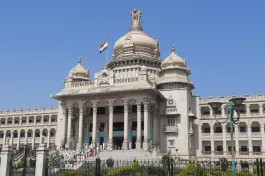Martin Wolf’s book The Crisis of Democratic Capitalism is an important and ambitious work that deserves to be read by a wide audience. Its primary strength is in laying out the background and setting the parameters for discussing a crisis that the world faces today.
Wolf is well known as the chief economics commentator at the Financial Times, the foremost business newspaper in the world. That he thinks both liberal democracy and market capitalism are in crisis is thus very significant. As he writes, the central argument of the book is to “recognize the need for substantial change if core Western values of freedom, democracy, and the Enlightenment are to survive. But in doing so, we must also remember that reform is not revolution.”
This admission indicates that Wolf perceives a challenge to Western civilisation itself, which is in the throes of a crisis that may require revolutionary change. His project, instead, is to save the current system, which he favours, and he points to the need of an ambitious social democratic programme of reform to do so.
The book must be read as a work of political economy. Its focus, for obvious reasons, is on the Western world, and particularly on its leader, the United States.
If James Baldwin’s works have had an impression on the writer, it is hard to discern. The weakness in Wolf’s historical treatment of the rise of markets and democracy is that he has no real notion of colour or colonialism.
The 496-page volume is divided into four parts. The first part – the weakest one – is on the historical evolution of market capitalism and liberal democracy. The second part – perhaps the strongest – evaluates the scope and factors behind the current crisis. The third sets out Wolf’s proposed agenda for a “new” new deal of social democratic reform. The final part, which Wolf says is the “most important,” addresses global challenges, including climate change and the rise of China.
The book starts with a reference to James Baldwin – its first chapter is entitled 'The Fire This Time'. However, if Baldwin’s works have had an impression on Wolf, it is hard to discern. The weakness in Wolf’s historical treatment of the rise of markets and democracy is precisely that he has no conceptualisation of colour or colonialism. His key argument is nevertheless interesting, for he argues that liberal democracy and global capitalism are deeply interlinked and will be saved (or presumably die) together.
It is Part 2 of the book – “What Went Wrong” – that is the most interesting. “Trust in democratic institutions, the global market economy and economic elites has faded over recent decades,” Wolf writes. Why? The culprits, he argues, are economic failures, including “rising inequality, weak growth of real incomes […] deindustrialization,” all of which were exacerbated by the financial crisis and austerity.
He points to inequality as a particularly significant failure, saying it alienates people and demonstrates the contempt elites have for ordinary people. Interestingly, Wolf does not see cultural factors, which have been the intense focus, particularly on the left, as primary explanations for the current crisis. He says, “The crucial difficulty with primarily cultural explanations is that they fail to provide an answer to the obvious question: Why now?”
While Wolf hints at the complexity of the economic changes that have taken place in the past few decades, he is clear that the faults in the economy can be traced to the elites and what he calls “rentier capitalism”, an economic system “in which a relatively small proportion of the population has successfully captured rents from the economy and uses the resources it has acquired to control the political and even legal systems.”
In Part III, Wolf argues for renewing capitalism and comes up with detailed proposals, many of which are broad and interesting. His ideological outlook, as he says, is of “reform, not revolution”.
Though he is firmly against populists such as Donald Trump, Wolf is not hysterical about their rise, as many on the US left have become. He refers to Thomas Piketty’s analysis of the evolution of political loyalties in France, the UK and the US and says it has led to a “Brahmin Left” (that is, highly educated) and a “Merchant Right.” There has been a split in the “educated class of leftist intellectuals and organized labor” – the first has become much bigger as educational opportunities increase and the second has weakened because of deindustrialisation.
Wolf observes, “Abandoned, as they see it, by traditional left-of-centre parties, the less-educated and less well-off members of the old working class […] believe that elites and especially the intellectual elite are hostile not just to their interests, but to their values and ethnic and national identities.” In these conditions of total alienation of the people from the elites, which is a crisis of legitimacy of the system, he asks if the centre can hold.
In Part III, Wolf argues for renewing capitalism and comes up with detailed proposals, many of which are broad and interesting. His ideological outlook, as he says, is of “reform, not revolution.” He offers a mildly updated version of Franklin D. Roosevelt’s programme – a higher and sustainable standard of living, good jobs, equality of opportunity, security, and the ending of special privileges for the few.
Wolf welcomes openness in trade and foreign direct investment but not in finance. Further, he indicates in several places that an “open border” policy is unsustainable and immigration must be controlled in a way that is “humane yet also acceptable to the great majority of citizens.” In terms of equality of opportunity, he thinks the emphasis should be on poverty and class and not on race or gender. He supports the welfare state but is against proposals such as that for a universal basic income.
Finally, Wolf is blunt about how society now benefits the few, writing that there is a “corporate governance regime that rewards powerful insiders, a competition regime that tolerates powerful monopolies, a regulatory regime that tolerates corruption, and, not least, a tax system that makes paying taxes by the wealthy almost voluntary.”
There are some serious weaknesses in Wolf’s work. The first is almost totally ignoring the US’s ‘forever wars’ and its military industrial complex. Wolf fails to consider both the domestic effect of these wars and how they have been viewed internationally.
In the final part of the book, where he considers the international challenges facing liberal democracy, the focus is almost entirely on the rise of China and the threat it represents to the West. Wolf thinks that the relationship between liberal democracies and China is more complex than the Cold War. He sees China as “a far more potent adversary than the Soviet Union.” In conclusion, he wants comprehensive reforms that can rejuvenate the West in building an alliance of liberal democracies.
There are some serious weaknesses in Wolf’s work. The first is almost totally ignoring the US’ “forever wars” and its military industrial complex. Wolf fails to consider both the domestic effect of these wars and how they have been viewed internationally. He fails to see the American empire’s systemic link to the collapse of liberal democracy at home. His call for an “alliance of liberal democracies” will be read as nothing but a call for a united Western world that can continue its neo-colonial hold over the world.
Second, there are several aspects of the crisis in the US, particularly in its cities, which he does not consider. These include gentrification, increasing gun violence, a dysfunctional prison system, and the collapsing public school system.
Wolf, ironically, maintains an elitist worldview where the people have no role in making history.
Finally, there is a question of agency. Who will implement the reforms that Wolf lays out? For him, the agency lies with the enlightened elites who he hopes to convince to save the system. This sentimental appeal comes off as weak and ineffective – the weaknesses of his historical understanding are reflected in the weakness of his future vision.
Wolf treats the two democratic revolutions in the US – which expanded the notion of citizenship, ended slavery, and brought about Reconstruction and the civil rights movement – casually and very briefly. He does not even mention the name of Martin Luther King Jr. once in this long book. This explains why his theorisation of democracy falls short. Wolf, ironically, maintains an elitist worldview where the people have no role in making history.
The importance of Wolf’s book is that it is an honest attempt to detail the crisis in the West and the crisis of legitimacy in its leading power, the US. However, it may be too late in the day for the kind of reform that Wolf desires and certainly there is little political will. The question he raises – reform or revolution? – is for the American people to answer. However, Martin Luther King Jr. may have framed it more aptly: Where Do We Go From Here: Chaos or Community?
Archishman Raju is a scientist based in Bengaluru associated with the Gandhi Global Family and Saturday Free School, Philadelphia.









